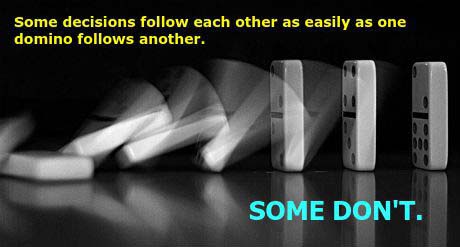How to Make Difficult Decisions: 8 Questions to Ask Yourself, B

So, what can psyche tell us about how to make difficult decisions?

In Part One, Questions 1. to 4., we looked at the pressures, conscious and unconscious, that might bear on how we make decisons. Here we deepen the questioning.
5. What does my body tell me about this decision? (or how do I feel?)
Isn’t the body irrelevant to decision making? Actually, not at all. If we listen to our bodies, they tell us a great deal about what is right and wrong for us in the decisions we have to make. Many times, our bodies reflect our real feelings, when we’re not conscious of them. The body’s state can show us much about the emotion that we’re carrying deeply within us.
To feel this, we have to understand the language that the body speaks. Consider an individual who decides to accept a promotion and transfer to a far away city, who immediately upon doing so starts to experience stomach trouble to the point vomiting and diarrhea. That person might tell themselves that this response is just a natural expression of nerves. But therapy might well reveal that a more appropriate interpretation is that the body simply “can’t stomach” the transfer.
Modern Jungian therapy knows it’s wise to try and hear, rather than ignore, the deeper wisdom of the body. It can make all the difference between a decision that is fundamentally affirming of self and life, and a decision that rides roughshod over who we really are.
Disrupted sleep, rock-hard muscular tension and the racing heart of anxiety all speak volumes. The conscious mind might not know, but the body knows something about how to make difficult decisions.
6. What Are my Dreams Saying?

My dreams may also speak an earthy and earnest wisdom. In many ways, dreams may show us how a decision relates to the deepest self. They may put the decision in the context of our earlier experience, our fundamental personal makeup, and our most basic biological, evolutionary and cultural heritage. Depth case studies on dreams may reveal that we are being pressured into a certain course of action by a bullying father complex. It can also show when a particular course of action holds the promise opening up a whole range of psychological possibilities, or a way to move forward and out of a seemingly insoluble dilemma.
Noting our dreams and getting help to understand their language is an excellent aid to decision making.
7. Do I Need to Make this Decision, or to Hold the Tension?

In the last post, we saw how an overly strong sense of urgency about making a decision might be caused by a psychological complex. But even if we’re not being needled by a complex, it may be very valuable to ask whether it’s the right time for us to make an important decision.
Sometimes, especially with key decisions, it may be important for us to just sit for a time with two incompatible options. As Jung might tell us, sometimes just considering the two irreconcilables can lead to the emergence of a third completely unexpected alternative that leads out of a dilemma in a completely expected way.
As leading neuroscientist Prof. Joseph LeDoux of NYU tells us, most of mental processing is unconscious. If the conscious part of ourselves which is always trying frantically to plug every hole in the dyke can stand back, sometimes what emerges from the unconscious mind is an unbelievably apt contribution to solving our dilemmas.
8. Who am I — Really?
This can be an important question because, often, it’s possible to be just too definite about “who I am”.
Certainly, I can try to map out what kind of person I am, and see how that helps me decide for this or that option. “I’ve never been a dancer; there’s no way I’m going to salsa classes with my wife.” “My partner might like the suburbs, but that’s not who I am as a woman — I’d never go there!”
Yet, more often , it’s easy for our preconceptions about ourselves to influence our decisions, and even to interfere with our decisions.
It’s wise for me to stay open, and not have too pat an idea of who I am.
Depth case studies can help us to bring the whole of who we are as a person to the challenges of major life decisions.
Brian Collinson, Psychotherapist and Jungian Analyst
[cta]
